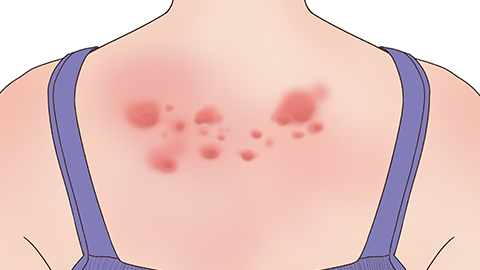What hives indicate about your body's problems
Generally, urticaria may indicate potential issues such as allergic constitution, sensitive skin and mucous membranes, food or drug allergies, infections, or abnormal immune function. It is recommended to seek medical attention promptly, identify the underlying cause, and receive symptomatic treatment under a doctor's guidance. Specific analyses are as follows:

1. Allergic constitution: The body's immune system is overly sensitive to various external substances, easily triggering abnormal immune responses that lead to urticaria. Avoid known allergens such as pollen and dust mites. Wear masks when going outdoors, regularly clean and remove mites at home, and reduce opportunities for allergic reactions.
2. Sensitive skin and mucous membranes: Weak barrier function of the skin and mucous membranes makes them prone to blood vessel dilation and increased permeability when stimulated by temperature changes or friction, thus inducing urticaria. Pay attention to daily skin care, avoid frequent use of irritating cleansing products, wear loose cotton clothing, and minimize skin irritation from friction.
3. Food or drug allergy: Consuming allergenic foods such as seafood or mango, or using medications like penicillin or cephalosporins, can trigger an immune attack leading to urticaria. Immediately discontinue suspected allergenic foods or drugs. Follow medical advice to take antihistamines such as cetirizine hydrochloride tablets, loratadine capsules, or ebastine tablets to relieve allergic symptoms.
4. Infection factors: Bacterial or viral infections stimulate the immune system to produce abnormal reactions, causing urticaria, often accompanied by symptoms such as fever and fatigue. Treatment should be directed at the type of infection under medical supervision—for example, bacterial infections may be treated with cefuroxime axetil tablets, amoxicillin capsules, or roxithromycin dispersible tablets—while simultaneously using antiallergic medications to improve urticaria symptoms.
5. Autoimmune abnormalities: Immune system dysregulation leads to mistaken attacks on the body’s own tissues, causing vascular inflammation and chronic urticaria, which tends to recur. Follow medical instructions to use immunomodulatory drugs such as methylprednisolone tablets, dexamethasone tablets, or cyclosporine soft capsules to regulate immune function, control inflammatory responses, and reduce the frequency of urticaria episodes.
In daily life, maintain a light diet, avoid spicy and irritating foods, and consume more fresh vegetables and fruits. Keep regular作息 (daily routines), avoid excessive fatigue, engage in moderate exercise to strengthen physical health, reduce the recurrence of urticaria, and support stable immune function.






